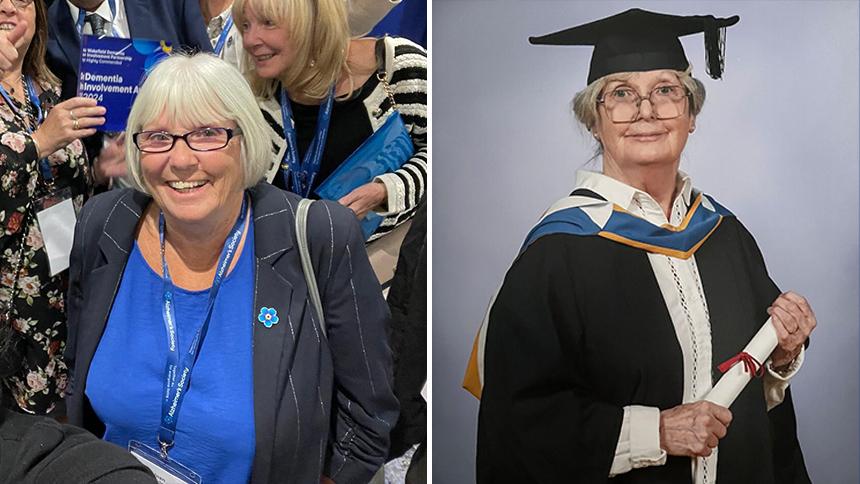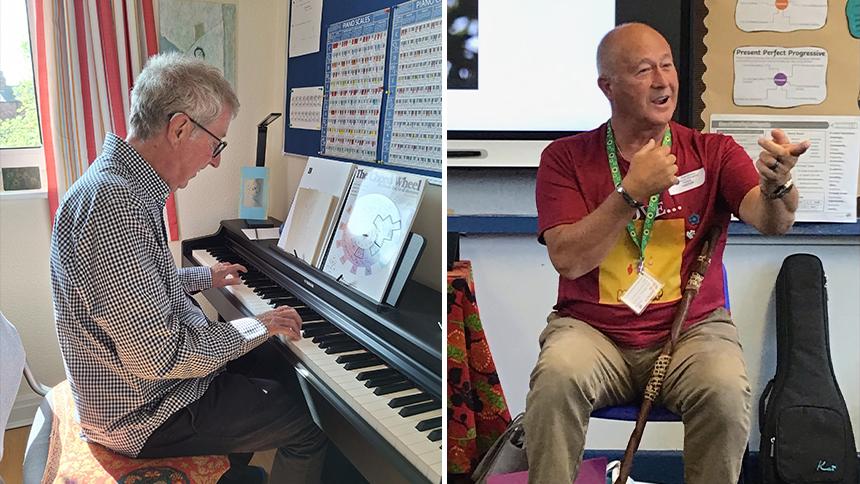Real stories
Learning and doing something new after a dementia diagnosis
Four people who’ve pursued fresh experiences and learned new skills after their dementia diagnosis.
There’s lots to process after receiving a dementia diagnosis and it can trigger many life changes.
People might feel less confident doing some of the things they enjoy. However, it can also inspire people to take new paths.
We hear from Joan, Veronica, Steven and John about the challenges of their dementia diagnoses and how they've discovered new interests and challenges.

Joan and Veronica
Public speaking about dementia
After joining a peer support group, Joan Taylor in West Yorkshire has found her voice.
‘I’ve always been a sociable person. I worked in a care home, organising activities and really enjoyed it.
After my diagnosis, I felt horrible. I was in a big, black hole. I cried a lot.
‘I didn’t want to do anything or go anywhere. I just wanted to be at home because I felt safer there.
‘When I joined the Voices Together group, I felt supported straight away.
‘Everyone understood what I was experiencing because they were going through it too.
Our focus is helping other people, showing there’s life beyond your diagnosis.
‘Through the group, I was asked to speak at an event about my experiences at a healthcare managers meeting in Leeds.
‘Public speaking is a completely new experience, but I found it came naturally.
‘I speak from the heart about dementia. I don’t mind it if people ask me the difficult questions.
‘I’ve since spoken at an event at the National Coal Mining Museum. Our group has also made an awareness video.
‘I’d love to do more public speaking if the opportunity comes up.
‘I’m in a completely different place to when I got my diagnosis. I don’t want to hide away.
‘I tell people, don’t be afraid to give new things a try. Grab everything with both hands and make best of what you’ve got.’
Studying after a dementia diagnosis
Veronica Ashby, in Derbyshire, studied for a master’s degree in sustainability.
‘My initial response to my diagnosis was denial.
It shocked me so much that I refused to accept it was happening.
‘As my memory worsened, I suffered with anxiety. Medication helped but I realised it was having a greater negative impact than my memory issues.
‘To explore what was happening with my brain, I decided to complete some online short courses and became fascinated with sustainability.
‘I wanted to learn more and test my mental capacity, so I enrolled to do a master’s in the green economy at Bournemouth University.
‘It was a 12-month, online course with online lectures and meetings as well as assignments. I developed strategies to enable me to manage the learning and the support of the staff was amazing.
‘Studying has given me – and those who know me well – a new confidence and understanding that dementia need not govern your entire life.
‘When people say, “I can’t believe you have dementia,” I think, “Well only part of me does!”
‘Take it one small step at a time after your diagnosis. Tune into your own feelings and move on when you feel inspired. Take all the time it needs and do a good job.’

Steven and John
Learning to play the piano
Steven Peacock, in North Yorkshire, has learned to play the piano and released an album of his own music.
‘Like many people, I often wished I could play an instrument.
‘I had never got around to doing anything about it until one day when I said to my wife Brigit, “I want to learn the piano”. This was a few weeks after I had been diagnosed with dementia.
‘I bought a digital piano and did some online tutorials. But this had its limitations, so Brigit searched for a teacher and found Annie.
‘It turns out that Annie was just the right person at the right time. We agreed we wouldn’t focus on grades and sitting exams but on the fundamentals, and we’d make learning fun.
‘I started composing my own music soon after beginning lessons and Annie suggested I make an album. I felt such a wonderful sense of achievement.
‘I play most days, even if it’s just a few minutes.
It’s a powerful way to be in the moment. And, almost magically, it gives me a sense of me, who I am and who I’ve been.
‘It’s a difficult thing to describe but I know what I mean.
‘It can be very difficult to imagine a positive future after a diagnosis.
‘But you can carry on doing the things you like and even go on an entirely new journey.
‘Brigit and I agreed early after diagnosis, “Don’t let the things you can’t do stop you from doing the things you can do.” It’s true. Do it. It works.’
Educating children about dementia
John Hyde, in Somerset, visits local schools to talk with young people about dementia.
‘When I first heard about Alzheimer’s Society’s schools project, I thought, “I’d love to be involved in that,” and the rest is history.
It’s a symbiotic thing. I get a lot from it and the young people do too.
‘It makes them aware of their own inbuilt empathy.
‘If I could plant a seed in a young brain that might inspire future dementia research – imagine that!
‘They ask difficult questions. But I don’t mind, I’m there to educate them.
‘A few weeks ago, an eight-year-old asked, “Are you happy now that you’ve got dementia?” and the room fell silent.
‘I replied, “I’ve been a lonely person most of my working life. But because of my dementia I get to come here and meet you all, so I’m very happy today.”
‘I’m convinced that because I fill my days with activities and learning, it’s helping my dementia journey.
‘I’ve taught myself to play the ukulele, recorded podcasts, started to draw, written children’s books. I’m also a research volunteer and talk with medical students.
‘I used to work as a self-employed handyman. I was shy and introverted.
‘Dementia has allowed me the freedom to throw myself at things that perhaps I’d have been embarrassed to try before.
I’d always say to people, keep doing and learning things.
‘I feel as though I’m about 10 times more alive now than before my diagnosis.’
Your experiences
Is there an aspect of living with dementia that you’d like to share? Email us to find out more.

